Introduction to Business Law: Case Study - LAW105, Semester 2, 2018
VerifiedAdded on 2023/06/04
|12
|2184
|287
Case Study
AI Summary
This document provides a detailed solution to a commercial law case study, addressing several legal issues. It begins by examining whether Rupali breached her duty of care by including durian fruits in a pie without peeling them, applying the principles of negligence and the Caparo test. It further analyzes whether Rupali's inexperience provides a valid defense under Tort Law, concluding that it does not. The solution then assesses Johnny's vicarious liability for Rupali's negligence as her employer, applying agency principles. The case study then shifts to contract law, determining the validity of a contract between Li and the Lame Duck Restaurant, and whether a unilateral mistake occurred regarding the menu prices. Finally, it explores the potential consequences if the restaurant refuses to honor the contract, discussing breach of contract and potential remedies available to Li. The document references relevant case laws and legal principles to support its analysis.
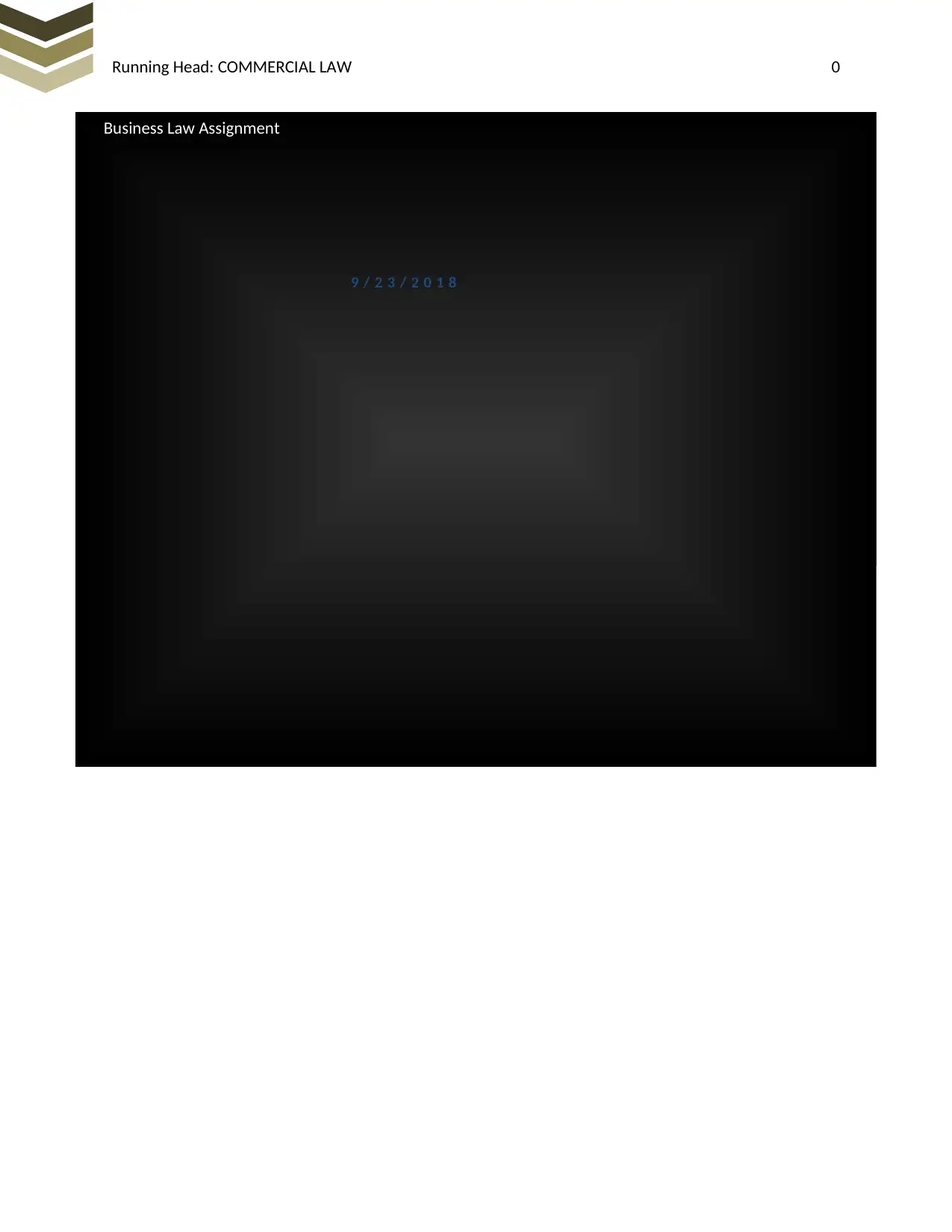
Business Law Assignment
Running Head: COMMERCIAL LAW 0
9 / 2 3 / 2 0 1 8
Student’s Name
Running Head: COMMERCIAL LAW 0
9 / 2 3 / 2 0 1 8
Student’s Name
Paraphrase This Document
Need a fresh take? Get an instant paraphrase of this document with our AI Paraphraser
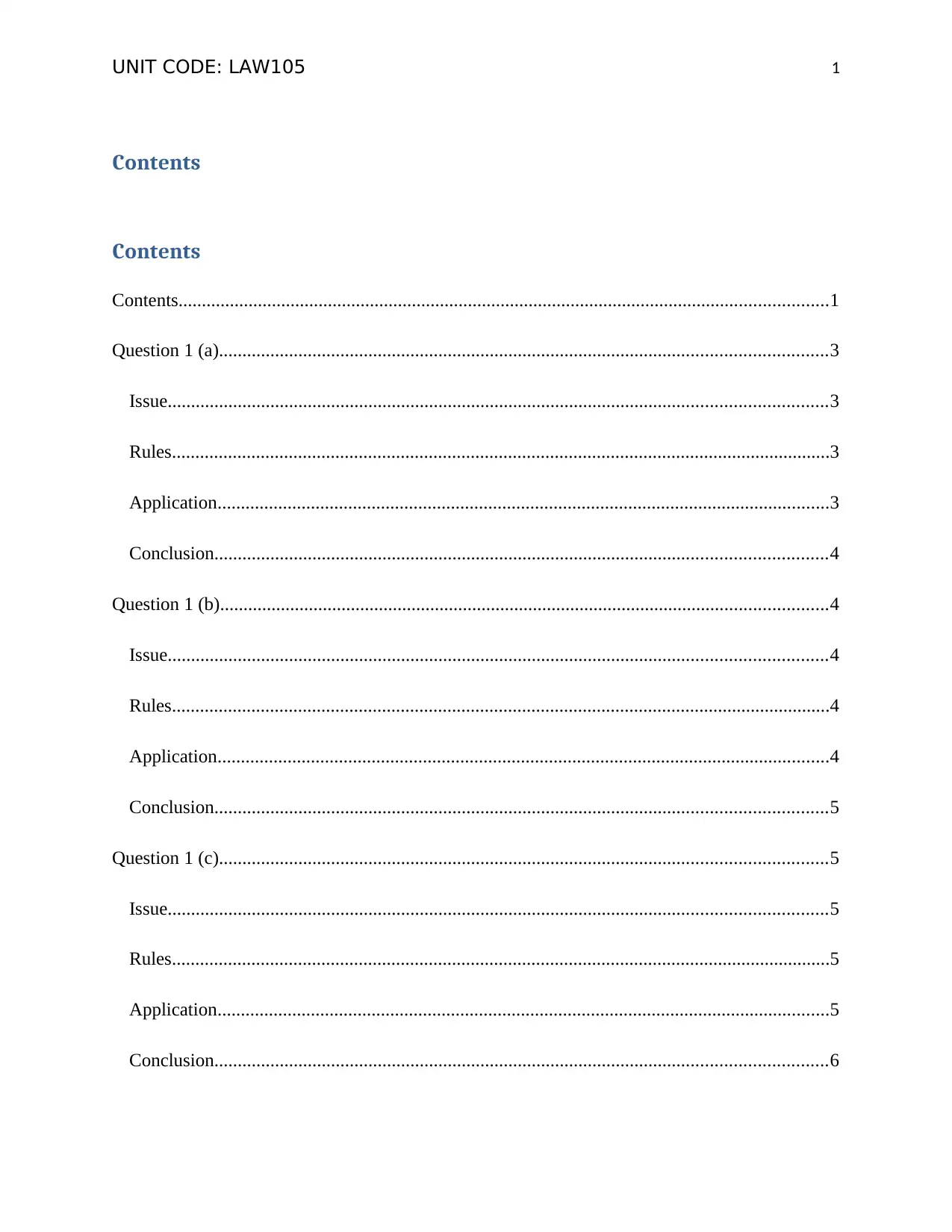
UNIT CODE: LAW105 1
Contents
Contents
Contents...........................................................................................................................................1
Question 1 (a)..................................................................................................................................3
Issue.............................................................................................................................................3
Rules.............................................................................................................................................3
Application...................................................................................................................................3
Conclusion...................................................................................................................................4
Question 1 (b)..................................................................................................................................4
Issue.............................................................................................................................................4
Rules.............................................................................................................................................4
Application...................................................................................................................................4
Conclusion...................................................................................................................................5
Question 1 (c)..................................................................................................................................5
Issue.............................................................................................................................................5
Rules.............................................................................................................................................5
Application...................................................................................................................................5
Conclusion...................................................................................................................................6
Contents
Contents
Contents...........................................................................................................................................1
Question 1 (a)..................................................................................................................................3
Issue.............................................................................................................................................3
Rules.............................................................................................................................................3
Application...................................................................................................................................3
Conclusion...................................................................................................................................4
Question 1 (b)..................................................................................................................................4
Issue.............................................................................................................................................4
Rules.............................................................................................................................................4
Application...................................................................................................................................4
Conclusion...................................................................................................................................5
Question 1 (c)..................................................................................................................................5
Issue.............................................................................................................................................5
Rules.............................................................................................................................................5
Application...................................................................................................................................5
Conclusion...................................................................................................................................6
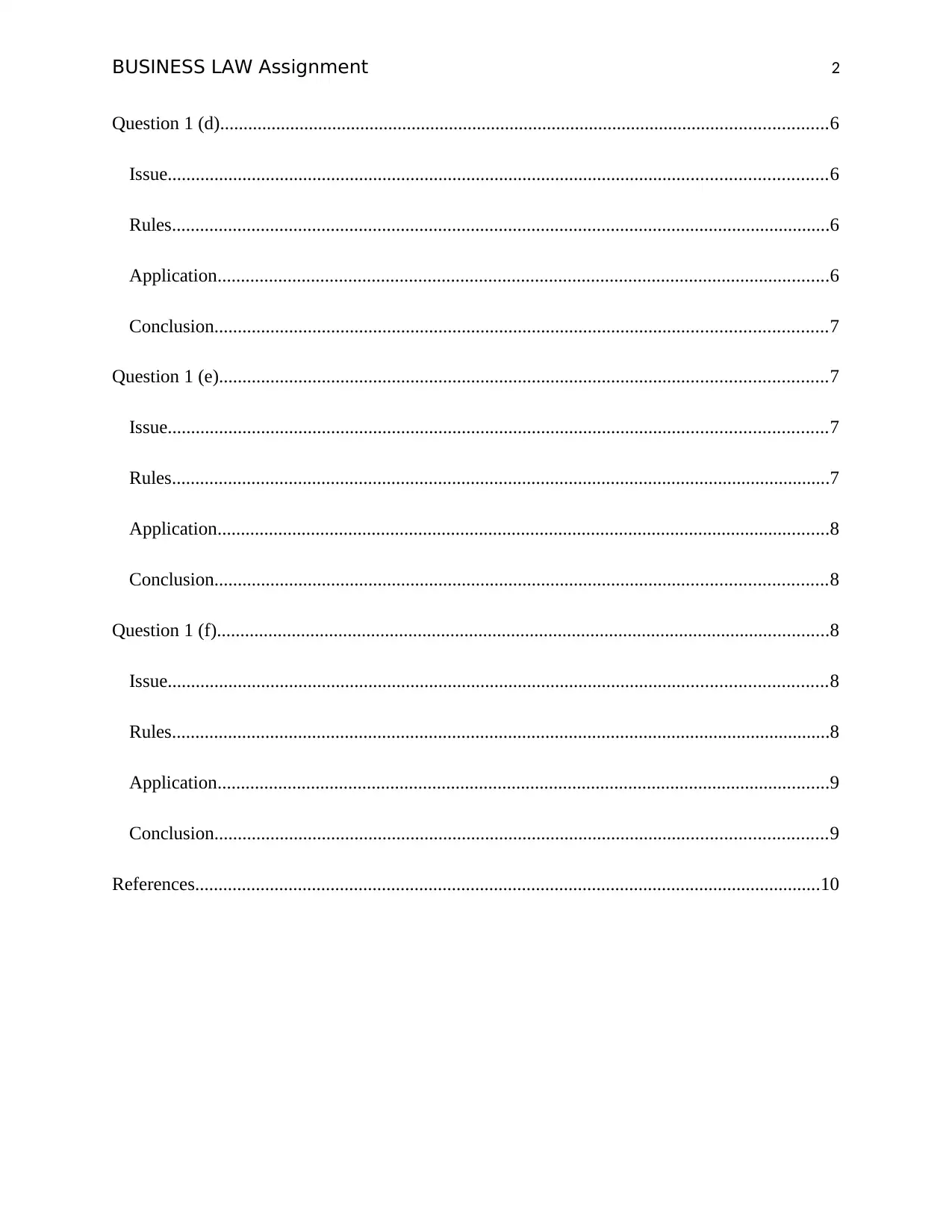
BUSINESS LAW Assignment 2
Question 1 (d)..................................................................................................................................6
Issue.............................................................................................................................................6
Rules.............................................................................................................................................6
Application...................................................................................................................................6
Conclusion...................................................................................................................................7
Question 1 (e)..................................................................................................................................7
Issue.............................................................................................................................................7
Rules.............................................................................................................................................7
Application...................................................................................................................................8
Conclusion...................................................................................................................................8
Question 1 (f)...................................................................................................................................8
Issue.............................................................................................................................................8
Rules.............................................................................................................................................8
Application...................................................................................................................................9
Conclusion...................................................................................................................................9
References......................................................................................................................................10
Question 1 (d)..................................................................................................................................6
Issue.............................................................................................................................................6
Rules.............................................................................................................................................6
Application...................................................................................................................................6
Conclusion...................................................................................................................................7
Question 1 (e)..................................................................................................................................7
Issue.............................................................................................................................................7
Rules.............................................................................................................................................7
Application...................................................................................................................................8
Conclusion...................................................................................................................................8
Question 1 (f)...................................................................................................................................8
Issue.............................................................................................................................................8
Rules.............................................................................................................................................8
Application...................................................................................................................................9
Conclusion...................................................................................................................................9
References......................................................................................................................................10
⊘ This is a preview!⊘
Do you want full access?
Subscribe today to unlock all pages.

Trusted by 1+ million students worldwide
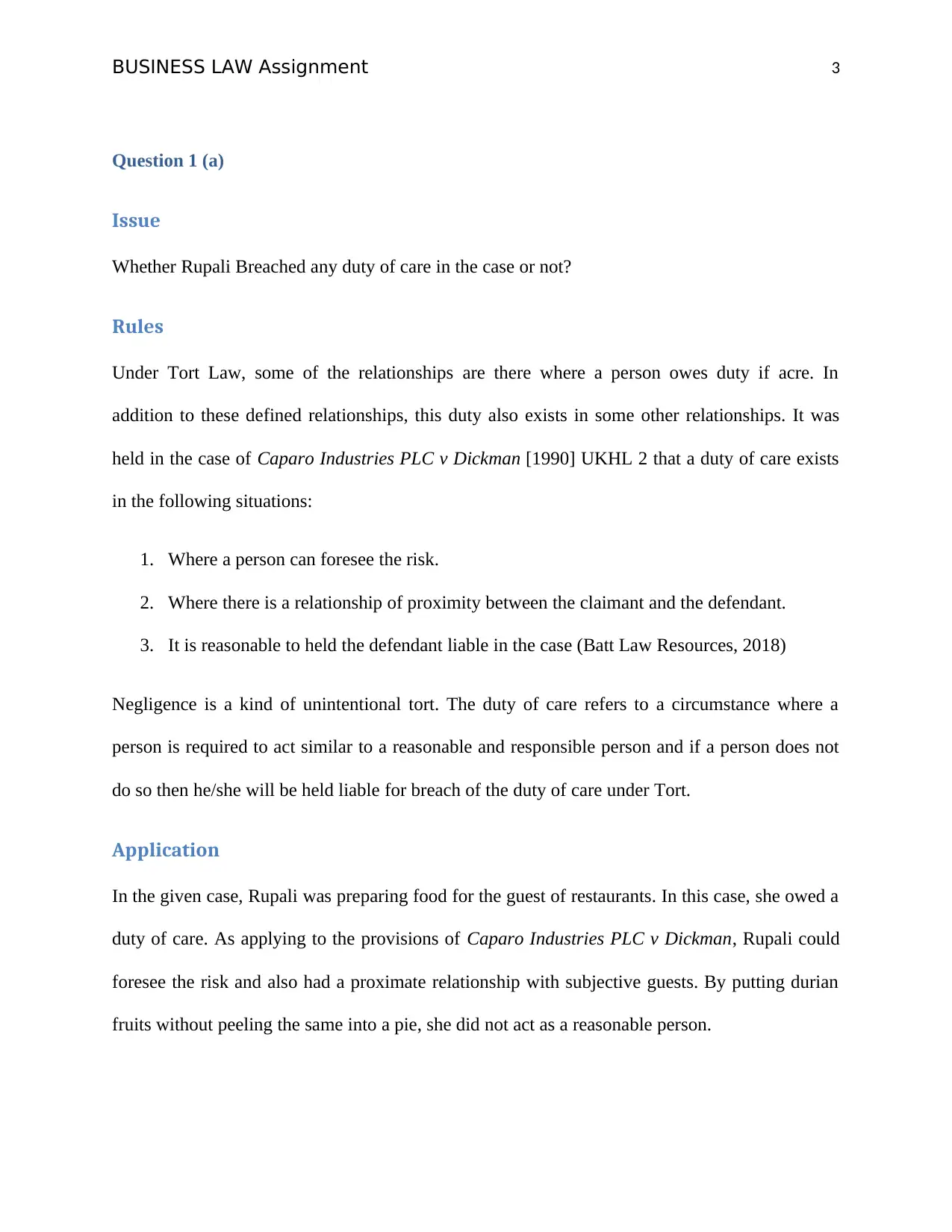
BUSINESS LAW Assignment 3
Question 1 (a)
Issue
Whether Rupali Breached any duty of care in the case or not?
Rules
Under Tort Law, some of the relationships are there where a person owes duty if acre. In
addition to these defined relationships, this duty also exists in some other relationships. It was
held in the case of Caparo Industries PLC v Dickman [1990] UKHL 2 that a duty of care exists
in the following situations:
1. Where a person can foresee the risk.
2. Where there is a relationship of proximity between the claimant and the defendant.
3. It is reasonable to held the defendant liable in the case (Batt Law Resources, 2018)
Negligence is a kind of unintentional tort. The duty of care refers to a circumstance where a
person is required to act similar to a reasonable and responsible person and if a person does not
do so then he/she will be held liable for breach of the duty of care under Tort.
Application
In the given case, Rupali was preparing food for the guest of restaurants. In this case, she owed a
duty of care. As applying to the provisions of Caparo Industries PLC v Dickman, Rupali could
foresee the risk and also had a proximate relationship with subjective guests. By putting durian
fruits without peeling the same into a pie, she did not act as a reasonable person.
Question 1 (a)
Issue
Whether Rupali Breached any duty of care in the case or not?
Rules
Under Tort Law, some of the relationships are there where a person owes duty if acre. In
addition to these defined relationships, this duty also exists in some other relationships. It was
held in the case of Caparo Industries PLC v Dickman [1990] UKHL 2 that a duty of care exists
in the following situations:
1. Where a person can foresee the risk.
2. Where there is a relationship of proximity between the claimant and the defendant.
3. It is reasonable to held the defendant liable in the case (Batt Law Resources, 2018)
Negligence is a kind of unintentional tort. The duty of care refers to a circumstance where a
person is required to act similar to a reasonable and responsible person and if a person does not
do so then he/she will be held liable for breach of the duty of care under Tort.
Application
In the given case, Rupali was preparing food for the guest of restaurants. In this case, she owed a
duty of care. As applying to the provisions of Caparo Industries PLC v Dickman, Rupali could
foresee the risk and also had a proximate relationship with subjective guests. By putting durian
fruits without peeling the same into a pie, she did not act as a reasonable person.
Paraphrase This Document
Need a fresh take? Get an instant paraphrase of this document with our AI Paraphraser
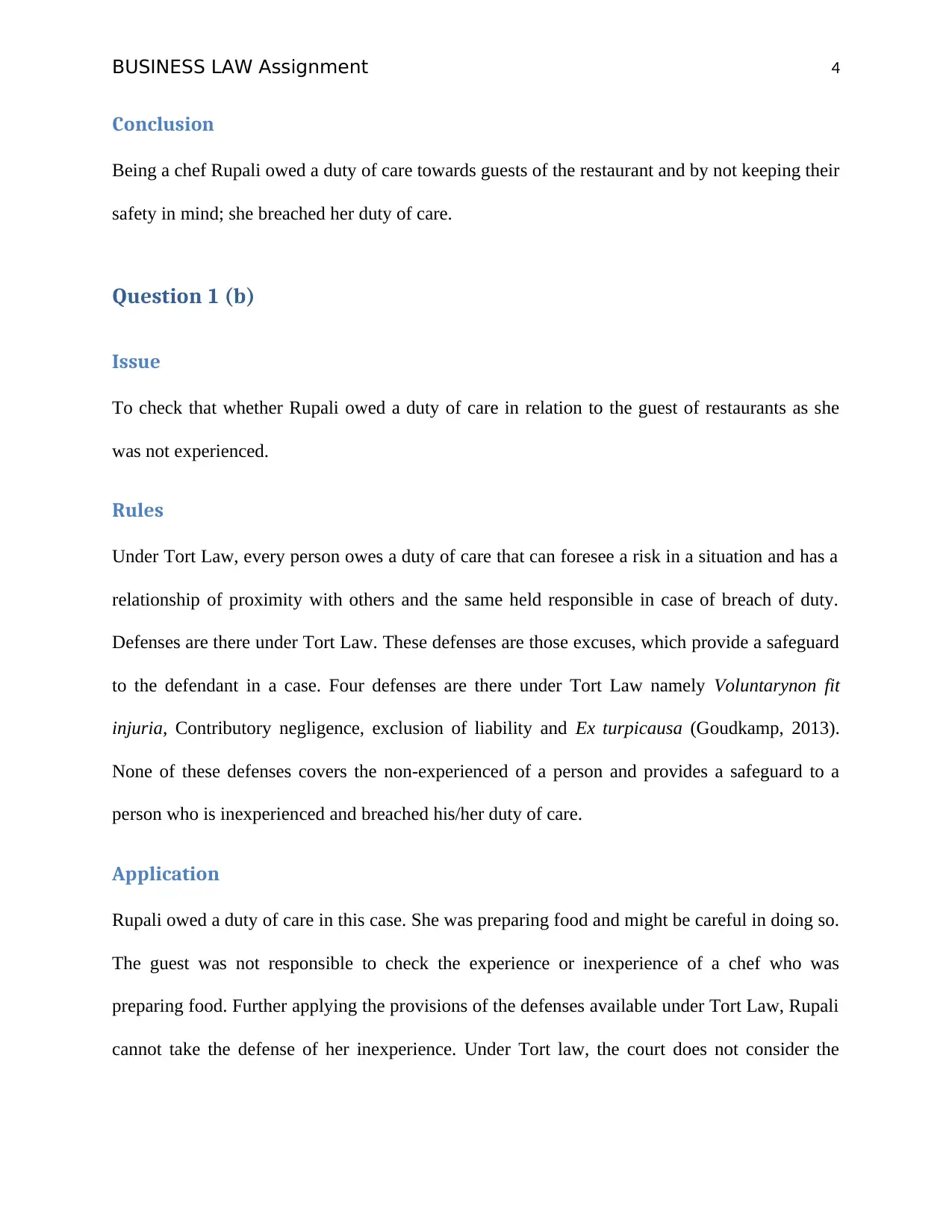
BUSINESS LAW Assignment 4
Conclusion
Being a chef Rupali owed a duty of care towards guests of the restaurant and by not keeping their
safety in mind; she breached her duty of care.
Question 1 (b)
Issue
To check that whether Rupali owed a duty of care in relation to the guest of restaurants as she
was not experienced.
Rules
Under Tort Law, every person owes a duty of care that can foresee a risk in a situation and has a
relationship of proximity with others and the same held responsible in case of breach of duty.
Defenses are there under Tort Law. These defenses are those excuses, which provide a safeguard
to the defendant in a case. Four defenses are there under Tort Law namely Voluntarynon fit
injuria, Contributory negligence, exclusion of liability and Ex turpicausa (Goudkamp, 2013).
None of these defenses covers the non-experienced of a person and provides a safeguard to a
person who is inexperienced and breached his/her duty of care.
Application
Rupali owed a duty of care in this case. She was preparing food and might be careful in doing so.
The guest was not responsible to check the experience or inexperience of a chef who was
preparing food. Further applying the provisions of the defenses available under Tort Law, Rupali
cannot take the defense of her inexperience. Under Tort law, the court does not consider the
Conclusion
Being a chef Rupali owed a duty of care towards guests of the restaurant and by not keeping their
safety in mind; she breached her duty of care.
Question 1 (b)
Issue
To check that whether Rupali owed a duty of care in relation to the guest of restaurants as she
was not experienced.
Rules
Under Tort Law, every person owes a duty of care that can foresee a risk in a situation and has a
relationship of proximity with others and the same held responsible in case of breach of duty.
Defenses are there under Tort Law. These defenses are those excuses, which provide a safeguard
to the defendant in a case. Four defenses are there under Tort Law namely Voluntarynon fit
injuria, Contributory negligence, exclusion of liability and Ex turpicausa (Goudkamp, 2013).
None of these defenses covers the non-experienced of a person and provides a safeguard to a
person who is inexperienced and breached his/her duty of care.
Application
Rupali owed a duty of care in this case. She was preparing food and might be careful in doing so.
The guest was not responsible to check the experience or inexperience of a chef who was
preparing food. Further applying the provisions of the defenses available under Tort Law, Rupali
cannot take the defense of her inexperience. Under Tort law, the court does not consider the
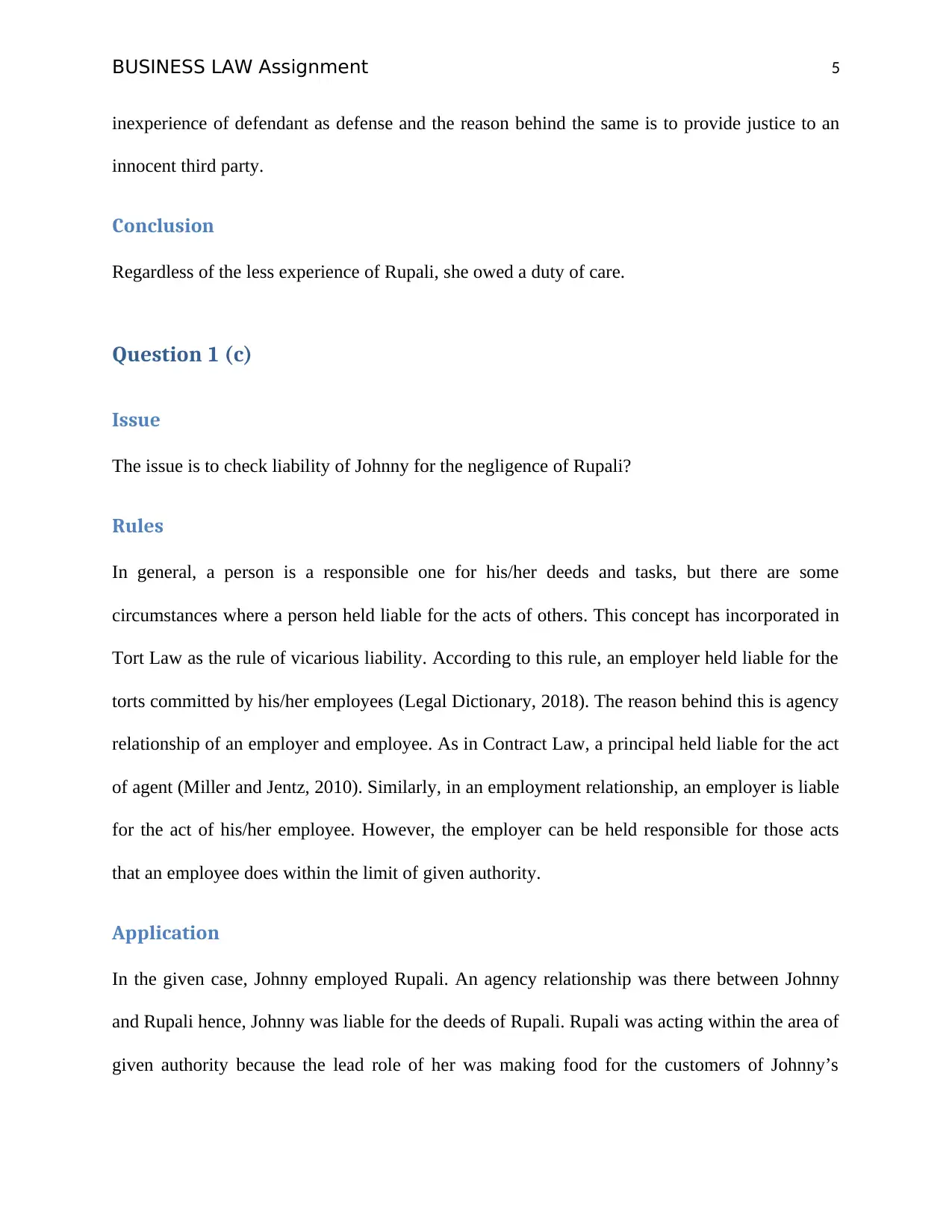
BUSINESS LAW Assignment 5
inexperience of defendant as defense and the reason behind the same is to provide justice to an
innocent third party.
Conclusion
Regardless of the less experience of Rupali, she owed a duty of care.
Question 1 (c)
Issue
The issue is to check liability of Johnny for the negligence of Rupali?
Rules
In general, a person is a responsible one for his/her deeds and tasks, but there are some
circumstances where a person held liable for the acts of others. This concept has incorporated in
Tort Law as the rule of vicarious liability. According to this rule, an employer held liable for the
torts committed by his/her employees (Legal Dictionary, 2018). The reason behind this is agency
relationship of an employer and employee. As in Contract Law, a principal held liable for the act
of agent (Miller and Jentz, 2010). Similarly, in an employment relationship, an employer is liable
for the act of his/her employee. However, the employer can be held responsible for those acts
that an employee does within the limit of given authority.
Application
In the given case, Johnny employed Rupali. An agency relationship was there between Johnny
and Rupali hence, Johnny was liable for the deeds of Rupali. Rupali was acting within the area of
given authority because the lead role of her was making food for the customers of Johnny’s
inexperience of defendant as defense and the reason behind the same is to provide justice to an
innocent third party.
Conclusion
Regardless of the less experience of Rupali, she owed a duty of care.
Question 1 (c)
Issue
The issue is to check liability of Johnny for the negligence of Rupali?
Rules
In general, a person is a responsible one for his/her deeds and tasks, but there are some
circumstances where a person held liable for the acts of others. This concept has incorporated in
Tort Law as the rule of vicarious liability. According to this rule, an employer held liable for the
torts committed by his/her employees (Legal Dictionary, 2018). The reason behind this is agency
relationship of an employer and employee. As in Contract Law, a principal held liable for the act
of agent (Miller and Jentz, 2010). Similarly, in an employment relationship, an employer is liable
for the act of his/her employee. However, the employer can be held responsible for those acts
that an employee does within the limit of given authority.
Application
In the given case, Johnny employed Rupali. An agency relationship was there between Johnny
and Rupali hence, Johnny was liable for the deeds of Rupali. Rupali was acting within the area of
given authority because the lead role of her was making food for the customers of Johnny’s
⊘ This is a preview!⊘
Do you want full access?
Subscribe today to unlock all pages.

Trusted by 1+ million students worldwide
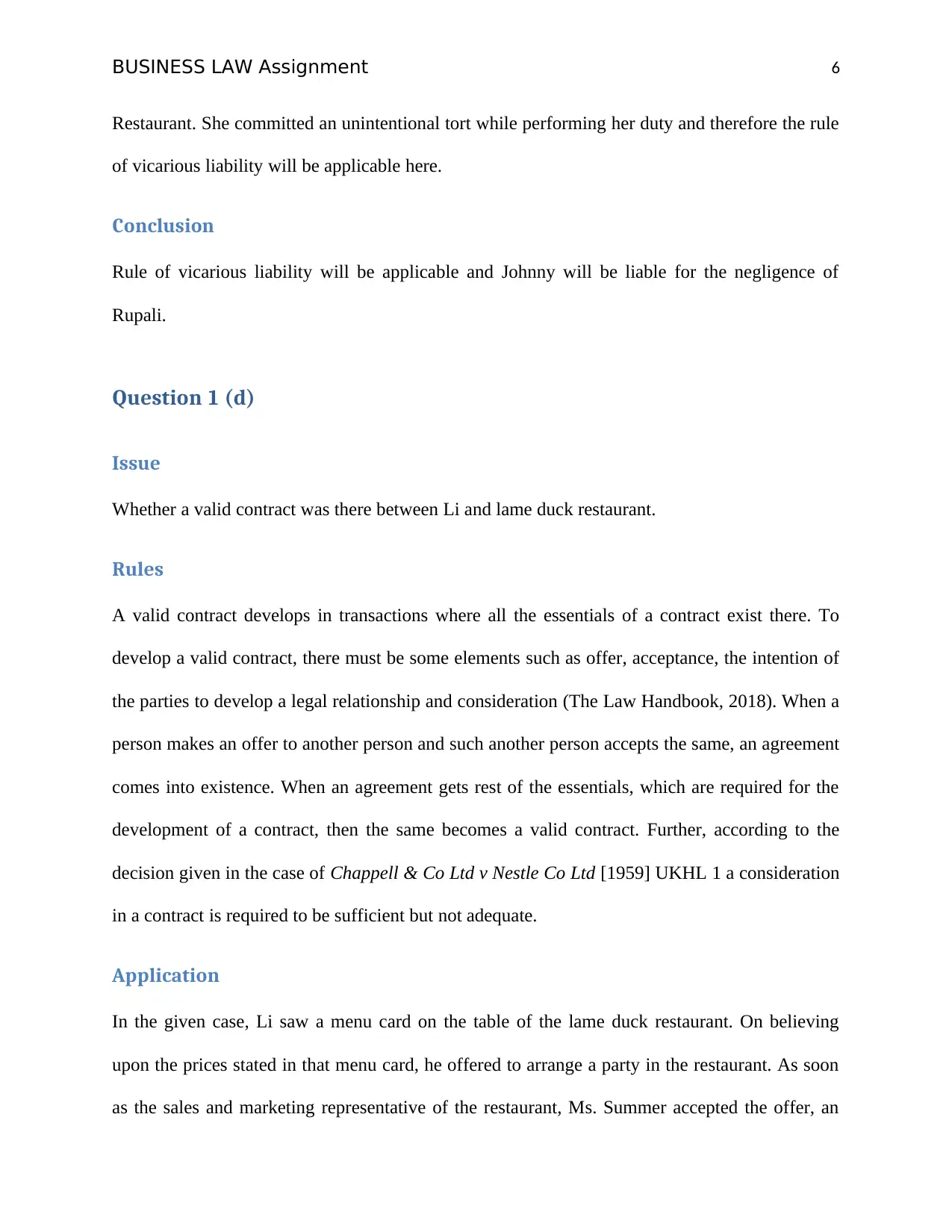
BUSINESS LAW Assignment 6
Restaurant. She committed an unintentional tort while performing her duty and therefore the rule
of vicarious liability will be applicable here.
Conclusion
Rule of vicarious liability will be applicable and Johnny will be liable for the negligence of
Rupali.
Question 1 (d)
Issue
Whether a valid contract was there between Li and lame duck restaurant.
Rules
A valid contract develops in transactions where all the essentials of a contract exist there. To
develop a valid contract, there must be some elements such as offer, acceptance, the intention of
the parties to develop a legal relationship and consideration (The Law Handbook, 2018). When a
person makes an offer to another person and such another person accepts the same, an agreement
comes into existence. When an agreement gets rest of the essentials, which are required for the
development of a contract, then the same becomes a valid contract. Further, according to the
decision given in the case of Chappell & Co Ltd v Nestle Co Ltd [1959] UKHL 1 a consideration
in a contract is required to be sufficient but not adequate.
Application
In the given case, Li saw a menu card on the table of the lame duck restaurant. On believing
upon the prices stated in that menu card, he offered to arrange a party in the restaurant. As soon
as the sales and marketing representative of the restaurant, Ms. Summer accepted the offer, an
Restaurant. She committed an unintentional tort while performing her duty and therefore the rule
of vicarious liability will be applicable here.
Conclusion
Rule of vicarious liability will be applicable and Johnny will be liable for the negligence of
Rupali.
Question 1 (d)
Issue
Whether a valid contract was there between Li and lame duck restaurant.
Rules
A valid contract develops in transactions where all the essentials of a contract exist there. To
develop a valid contract, there must be some elements such as offer, acceptance, the intention of
the parties to develop a legal relationship and consideration (The Law Handbook, 2018). When a
person makes an offer to another person and such another person accepts the same, an agreement
comes into existence. When an agreement gets rest of the essentials, which are required for the
development of a contract, then the same becomes a valid contract. Further, according to the
decision given in the case of Chappell & Co Ltd v Nestle Co Ltd [1959] UKHL 1 a consideration
in a contract is required to be sufficient but not adequate.
Application
In the given case, Li saw a menu card on the table of the lame duck restaurant. On believing
upon the prices stated in that menu card, he offered to arrange a party in the restaurant. As soon
as the sales and marketing representative of the restaurant, Ms. Summer accepted the offer, an
Paraphrase This Document
Need a fresh take? Get an instant paraphrase of this document with our AI Paraphraser
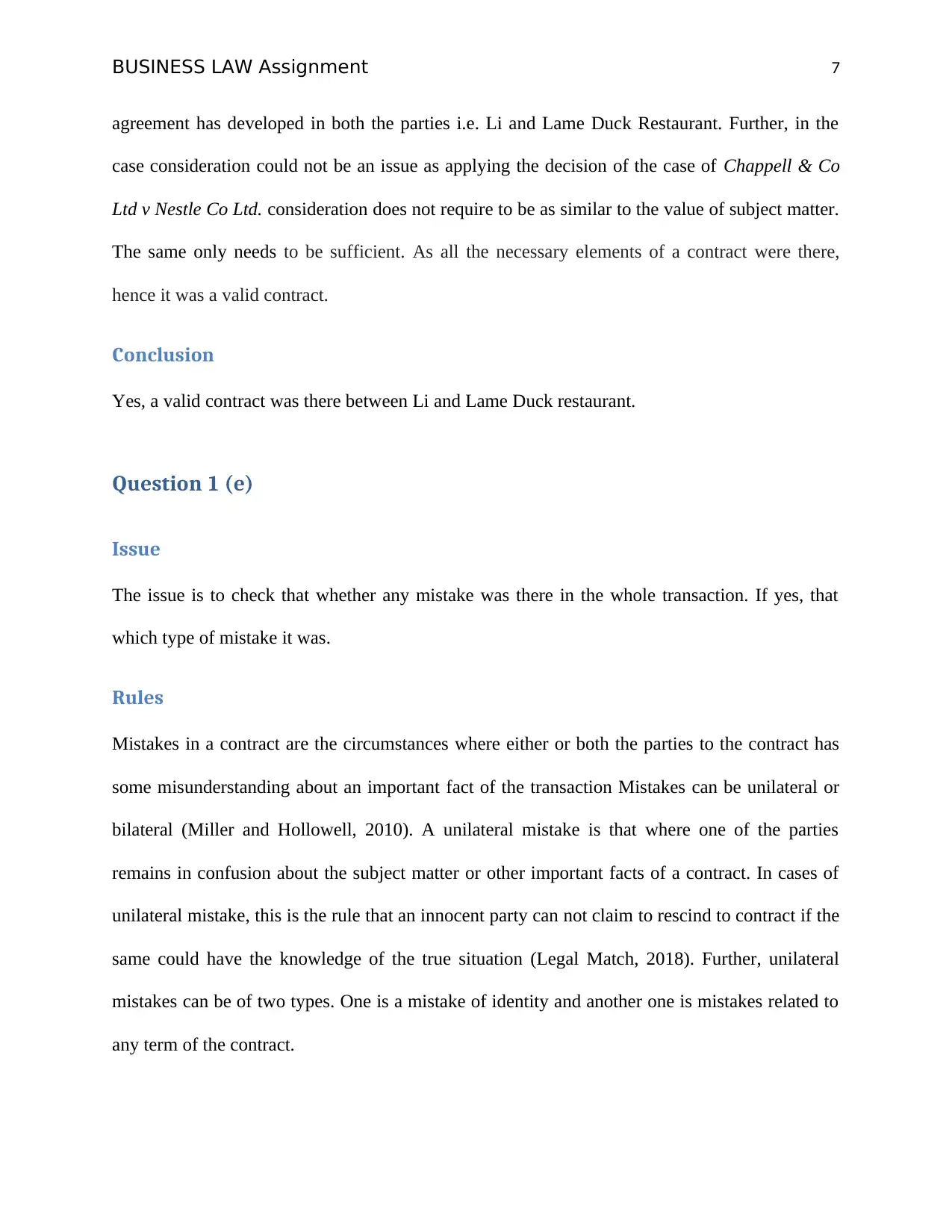
BUSINESS LAW Assignment 7
agreement has developed in both the parties i.e. Li and Lame Duck Restaurant. Further, in the
case consideration could not be an issue as applying the decision of the case of Chappell & Co
Ltd v Nestle Co Ltd. consideration does not require to be as similar to the value of subject matter.
The same only needs to be sufficient. As all the necessary elements of a contract were there,
hence it was a valid contract.
Conclusion
Yes, a valid contract was there between Li and Lame Duck restaurant.
Question 1 (e)
Issue
The issue is to check that whether any mistake was there in the whole transaction. If yes, that
which type of mistake it was.
Rules
Mistakes in a contract are the circumstances where either or both the parties to the contract has
some misunderstanding about an important fact of the transaction Mistakes can be unilateral or
bilateral (Miller and Hollowell, 2010). A unilateral mistake is that where one of the parties
remains in confusion about the subject matter or other important facts of a contract. In cases of
unilateral mistake, this is the rule that an innocent party can not claim to rescind to contract if the
same could have the knowledge of the true situation (Legal Match, 2018). Further, unilateral
mistakes can be of two types. One is a mistake of identity and another one is mistakes related to
any term of the contract.
agreement has developed in both the parties i.e. Li and Lame Duck Restaurant. Further, in the
case consideration could not be an issue as applying the decision of the case of Chappell & Co
Ltd v Nestle Co Ltd. consideration does not require to be as similar to the value of subject matter.
The same only needs to be sufficient. As all the necessary elements of a contract were there,
hence it was a valid contract.
Conclusion
Yes, a valid contract was there between Li and Lame Duck restaurant.
Question 1 (e)
Issue
The issue is to check that whether any mistake was there in the whole transaction. If yes, that
which type of mistake it was.
Rules
Mistakes in a contract are the circumstances where either or both the parties to the contract has
some misunderstanding about an important fact of the transaction Mistakes can be unilateral or
bilateral (Miller and Hollowell, 2010). A unilateral mistake is that where one of the parties
remains in confusion about the subject matter or other important facts of a contract. In cases of
unilateral mistake, this is the rule that an innocent party can not claim to rescind to contract if the
same could have the knowledge of the true situation (Legal Match, 2018). Further, unilateral
mistakes can be of two types. One is a mistake of identity and another one is mistakes related to
any term of the contract.
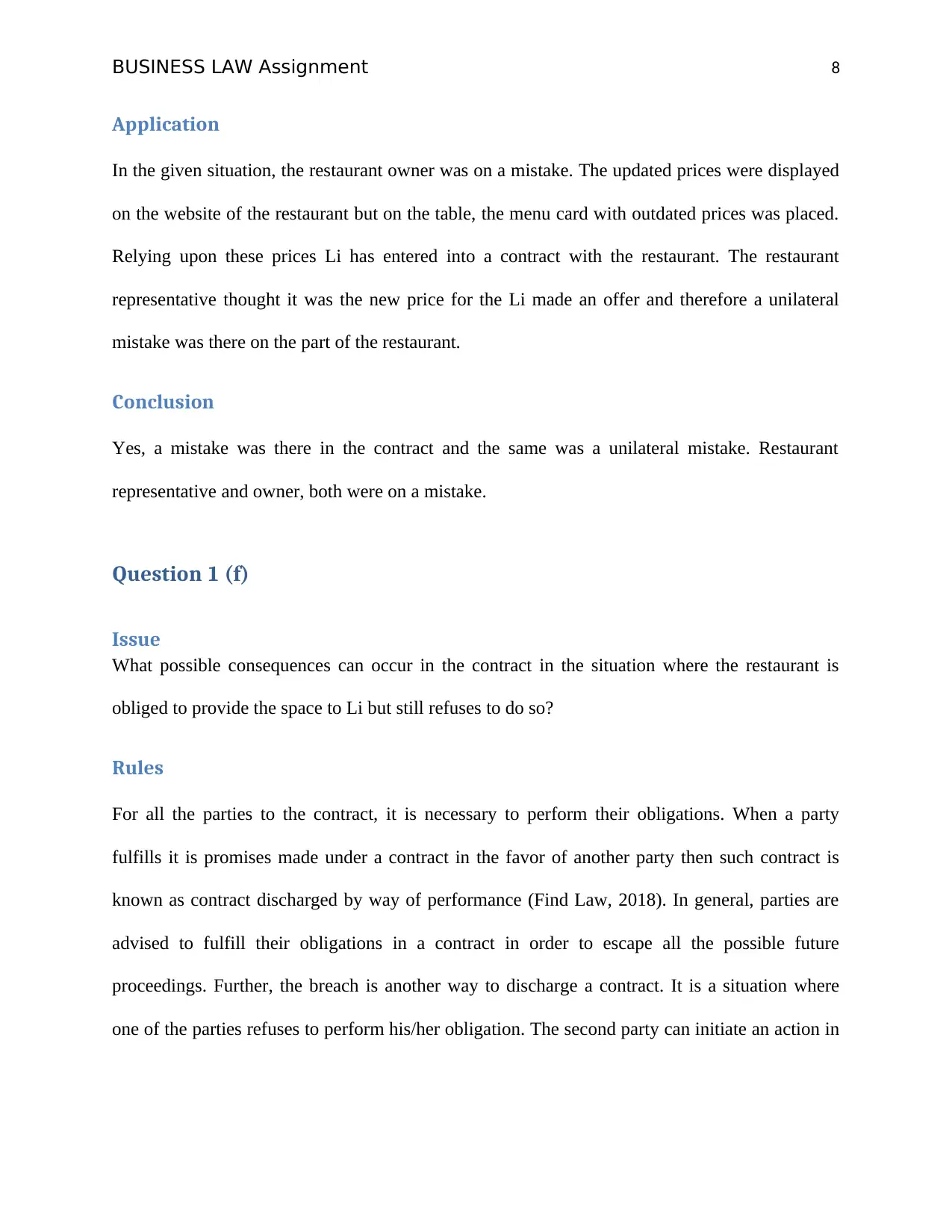
BUSINESS LAW Assignment 8
Application
In the given situation, the restaurant owner was on a mistake. The updated prices were displayed
on the website of the restaurant but on the table, the menu card with outdated prices was placed.
Relying upon these prices Li has entered into a contract with the restaurant. The restaurant
representative thought it was the new price for the Li made an offer and therefore a unilateral
mistake was there on the part of the restaurant.
Conclusion
Yes, a mistake was there in the contract and the same was a unilateral mistake. Restaurant
representative and owner, both were on a mistake.
Question 1 (f)
Issue
What possible consequences can occur in the contract in the situation where the restaurant is
obliged to provide the space to Li but still refuses to do so?
Rules
For all the parties to the contract, it is necessary to perform their obligations. When a party
fulfills it is promises made under a contract in the favor of another party then such contract is
known as contract discharged by way of performance (Find Law, 2018). In general, parties are
advised to fulfill their obligations in a contract in order to escape all the possible future
proceedings. Further, the breach is another way to discharge a contract. It is a situation where
one of the parties refuses to perform his/her obligation. The second party can initiate an action in
Application
In the given situation, the restaurant owner was on a mistake. The updated prices were displayed
on the website of the restaurant but on the table, the menu card with outdated prices was placed.
Relying upon these prices Li has entered into a contract with the restaurant. The restaurant
representative thought it was the new price for the Li made an offer and therefore a unilateral
mistake was there on the part of the restaurant.
Conclusion
Yes, a mistake was there in the contract and the same was a unilateral mistake. Restaurant
representative and owner, both were on a mistake.
Question 1 (f)
Issue
What possible consequences can occur in the contract in the situation where the restaurant is
obliged to provide the space to Li but still refuses to do so?
Rules
For all the parties to the contract, it is necessary to perform their obligations. When a party
fulfills it is promises made under a contract in the favor of another party then such contract is
known as contract discharged by way of performance (Find Law, 2018). In general, parties are
advised to fulfill their obligations in a contract in order to escape all the possible future
proceedings. Further, the breach is another way to discharge a contract. It is a situation where
one of the parties refuses to perform his/her obligation. The second party can initiate an action in
⊘ This is a preview!⊘
Do you want full access?
Subscribe today to unlock all pages.

Trusted by 1+ million students worldwide
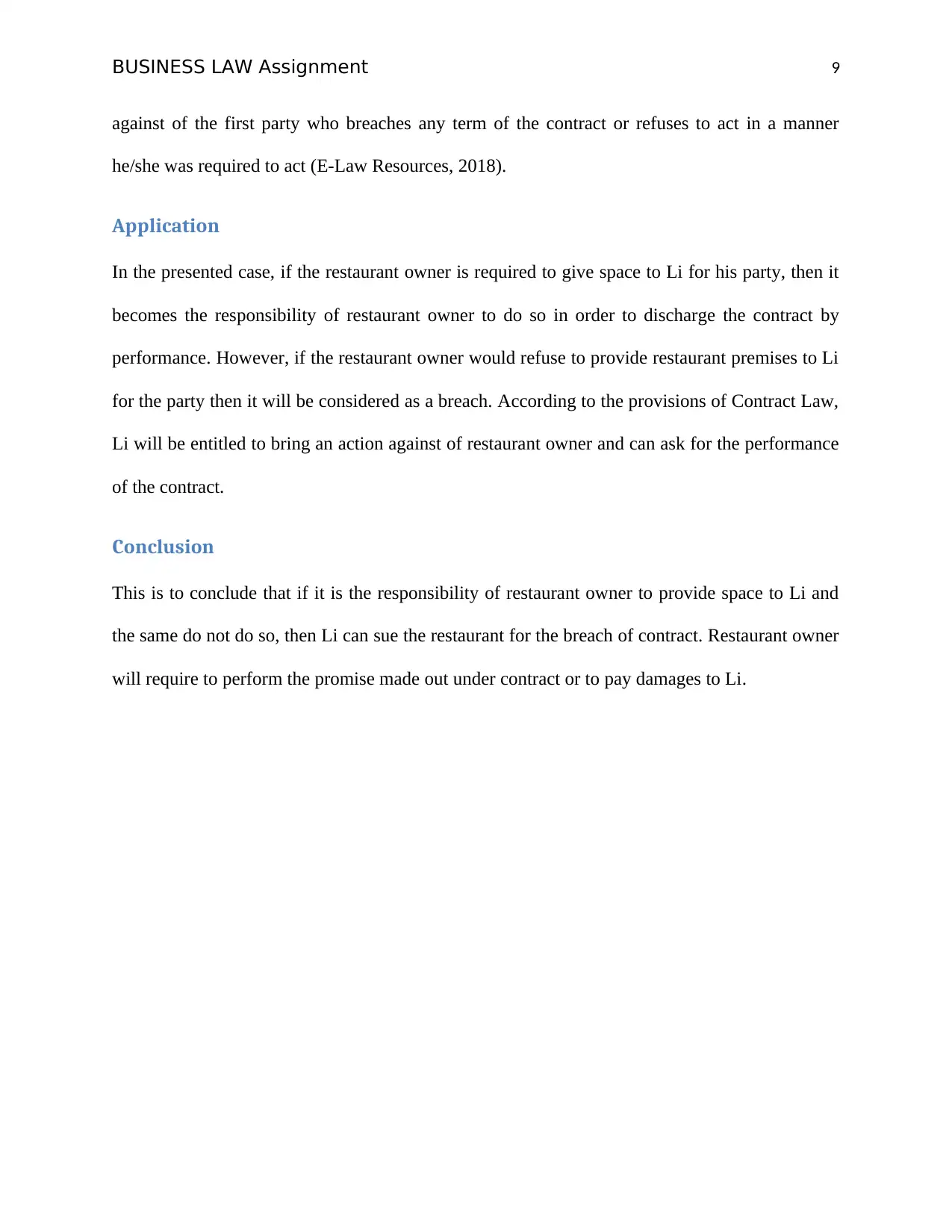
BUSINESS LAW Assignment 9
against of the first party who breaches any term of the contract or refuses to act in a manner
he/she was required to act (E-Law Resources, 2018).
Application
In the presented case, if the restaurant owner is required to give space to Li for his party, then it
becomes the responsibility of restaurant owner to do so in order to discharge the contract by
performance. However, if the restaurant owner would refuse to provide restaurant premises to Li
for the party then it will be considered as a breach. According to the provisions of Contract Law,
Li will be entitled to bring an action against of restaurant owner and can ask for the performance
of the contract.
Conclusion
This is to conclude that if it is the responsibility of restaurant owner to provide space to Li and
the same do not do so, then Li can sue the restaurant for the breach of contract. Restaurant owner
will require to perform the promise made out under contract or to pay damages to Li.
against of the first party who breaches any term of the contract or refuses to act in a manner
he/she was required to act (E-Law Resources, 2018).
Application
In the presented case, if the restaurant owner is required to give space to Li for his party, then it
becomes the responsibility of restaurant owner to do so in order to discharge the contract by
performance. However, if the restaurant owner would refuse to provide restaurant premises to Li
for the party then it will be considered as a breach. According to the provisions of Contract Law,
Li will be entitled to bring an action against of restaurant owner and can ask for the performance
of the contract.
Conclusion
This is to conclude that if it is the responsibility of restaurant owner to provide space to Li and
the same do not do so, then Li can sue the restaurant for the breach of contract. Restaurant owner
will require to perform the promise made out under contract or to pay damages to Li.
Paraphrase This Document
Need a fresh take? Get an instant paraphrase of this document with our AI Paraphraser
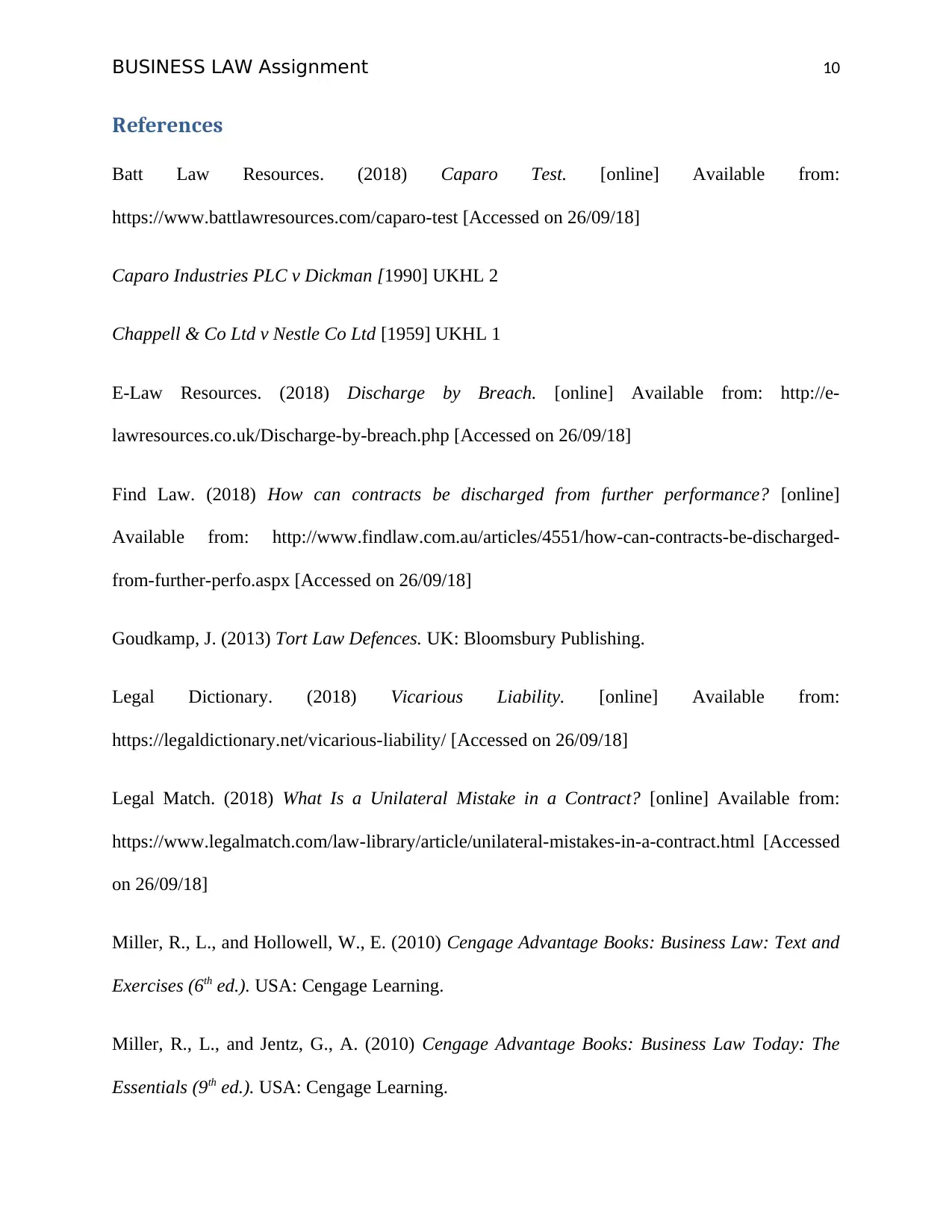
BUSINESS LAW Assignment 10
References
Batt Law Resources. (2018) Caparo Test. [online] Available from:
https://www.battlawresources.com/caparo-test [Accessed on 26/09/18]
Caparo Industries PLC v Dickman [1990] UKHL 2
Chappell & Co Ltd v Nestle Co Ltd [1959] UKHL 1
E-Law Resources. (2018) Discharge by Breach. [online] Available from: http://e-
lawresources.co.uk/Discharge-by-breach.php [Accessed on 26/09/18]
Find Law. (2018) How can contracts be discharged from further performance? [online]
Available from: http://www.findlaw.com.au/articles/4551/how-can-contracts-be-discharged-
from-further-perfo.aspx [Accessed on 26/09/18]
Goudkamp, J. (2013) Tort Law Defences. UK: Bloomsbury Publishing.
Legal Dictionary. (2018) Vicarious Liability. [online] Available from:
https://legaldictionary.net/vicarious-liability/ [Accessed on 26/09/18]
Legal Match. (2018) What Is a Unilateral Mistake in a Contract? [online] Available from:
https://www.legalmatch.com/law-library/article/unilateral-mistakes-in-a-contract.html [Accessed
on 26/09/18]
Miller, R., L., and Hollowell, W., E. (2010) Cengage Advantage Books: Business Law: Text and
Exercises (6th ed.). USA: Cengage Learning.
Miller, R., L., and Jentz, G., A. (2010) Cengage Advantage Books: Business Law Today: The
Essentials (9th ed.). USA: Cengage Learning.
References
Batt Law Resources. (2018) Caparo Test. [online] Available from:
https://www.battlawresources.com/caparo-test [Accessed on 26/09/18]
Caparo Industries PLC v Dickman [1990] UKHL 2
Chappell & Co Ltd v Nestle Co Ltd [1959] UKHL 1
E-Law Resources. (2018) Discharge by Breach. [online] Available from: http://e-
lawresources.co.uk/Discharge-by-breach.php [Accessed on 26/09/18]
Find Law. (2018) How can contracts be discharged from further performance? [online]
Available from: http://www.findlaw.com.au/articles/4551/how-can-contracts-be-discharged-
from-further-perfo.aspx [Accessed on 26/09/18]
Goudkamp, J. (2013) Tort Law Defences. UK: Bloomsbury Publishing.
Legal Dictionary. (2018) Vicarious Liability. [online] Available from:
https://legaldictionary.net/vicarious-liability/ [Accessed on 26/09/18]
Legal Match. (2018) What Is a Unilateral Mistake in a Contract? [online] Available from:
https://www.legalmatch.com/law-library/article/unilateral-mistakes-in-a-contract.html [Accessed
on 26/09/18]
Miller, R., L., and Hollowell, W., E. (2010) Cengage Advantage Books: Business Law: Text and
Exercises (6th ed.). USA: Cengage Learning.
Miller, R., L., and Jentz, G., A. (2010) Cengage Advantage Books: Business Law Today: The
Essentials (9th ed.). USA: Cengage Learning.
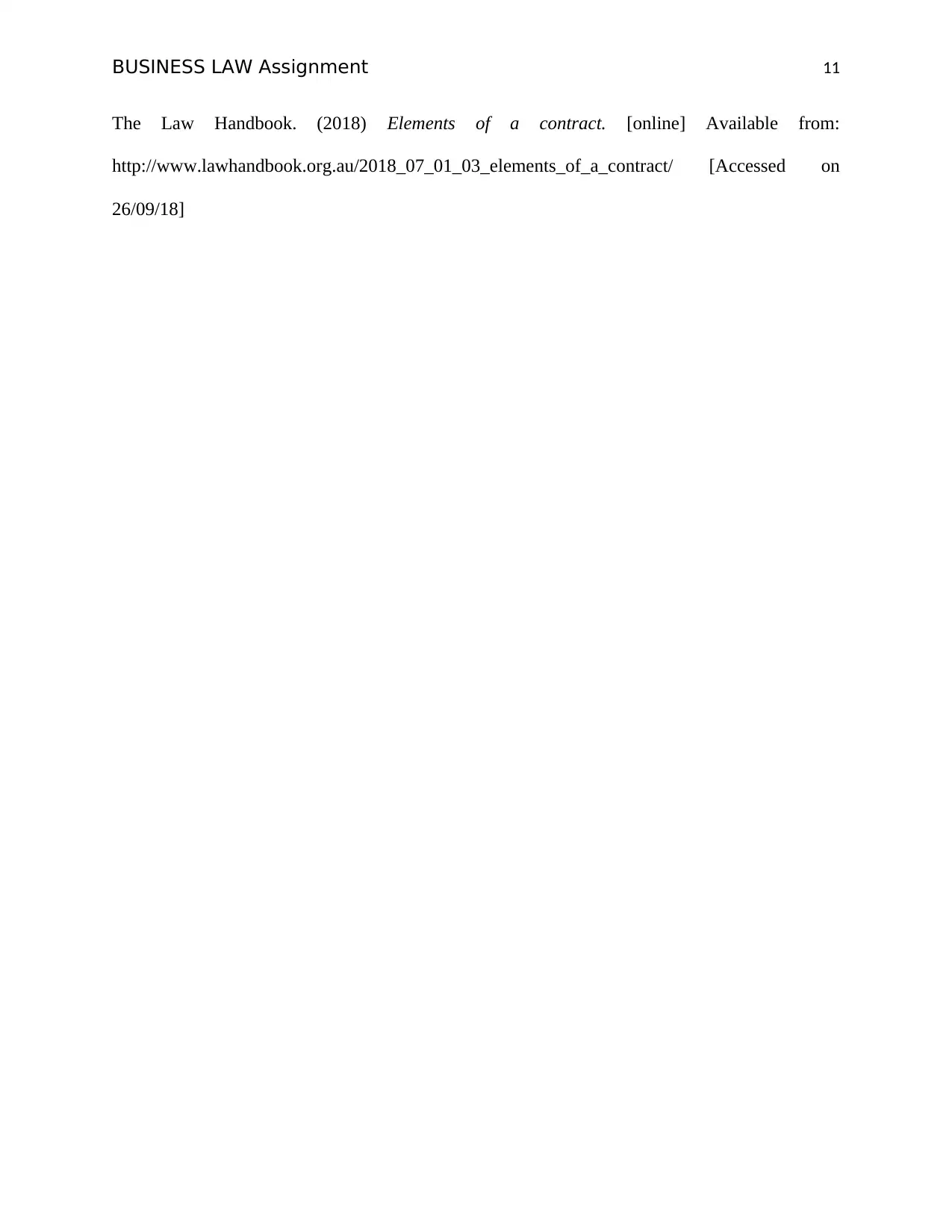
BUSINESS LAW Assignment 11
The Law Handbook. (2018) Elements of a contract. [online] Available from:
http://www.lawhandbook.org.au/2018_07_01_03_elements_of_a_contract/ [Accessed on
26/09/18]
The Law Handbook. (2018) Elements of a contract. [online] Available from:
http://www.lawhandbook.org.au/2018_07_01_03_elements_of_a_contract/ [Accessed on
26/09/18]
⊘ This is a preview!⊘
Do you want full access?
Subscribe today to unlock all pages.

Trusted by 1+ million students worldwide
1 out of 12
Related Documents
Your All-in-One AI-Powered Toolkit for Academic Success.
+13062052269
info@desklib.com
Available 24*7 on WhatsApp / Email
![[object Object]](/_next/static/media/star-bottom.7253800d.svg)
Unlock your academic potential
Copyright © 2020–2026 A2Z Services. All Rights Reserved. Developed and managed by ZUCOL.



